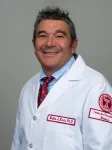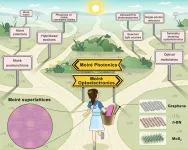(Press-News.org) (Philadelphia, PA) – Greater awareness and advances in treatment have greatly improved survival rates following heart attack. With more survivors, however, has come the challenge of managing long-term impacts on heart function, especially chronic heart failure, in which the heart gradually loses its ability to pump blood.
Mortality among individuals affected by chronic heart failure following a heart attack – referred to medically as myocardial infarction (MI) – is high. But, according to new research from a major collaborative effort led by scientists at the Lewis Katz School of Medicine at Temple University, more effective treatments may soon be within reach.
The new work centers on a molecule known as brain-derived neurotrophic factor (BDNF), showing that the loss of BNDF underlies post-MI heart failure. More significantly, the researchers demonstrate in animals that BDNF levels can be replenished therapeutically – abolishing damage to heart tissue and enabling the heart to recover.
“The identification of BDNF as a therapeutic target is an important step forward in the development of improved treatments for heart failure,” said Walter J. Koch, PhD, W.W. Smith Endowed Chair in Cardiovascular Medicine, Professor and Chair of the Department of Pharmacology and Director of the Center for Translational Medicine at the Katz School of Medicine, and senior author on the new study.
In addition to delineating the role of BDNF, Dr. Koch and colleagues show for the first time that reduced BDNF generation in the heart is associated with altered signaling of the β-adrenergic receptor (βAR) and that stimulation of a protein known as tropomyosin kinase receptor B (TrkB) enriches BDNF levels in the heart. “These actions combined attenuate the progression of heart failure,” Dr. Koch said.
Researchers Nazareno Paolocci, MD, PhD, Associate Professor of Medicine at Johns Hopkins University School of Medicine, and Alessandro Cannavo, PhD, a former postdoctoral fellow in Dr. Koch’s laboratory at Temple and now Associate Professor at University of Naples Federico II in Italy and lead author on the new report, collaborated with Dr. Koch to carry out the study. The group’s findings were published by the journal Circulation Research.
The researchers began their investigation by examining BDNF levels in wild-type mice whose hearts had been temporarily starved of blood, producing a state known as ischemia and thereby mimicking the effects of a heart attack. The mice subsequently developed chronic heart failure and were then treated with a TrkB agonist. In another set of experiments, the researchers generated mice that lacked BDNF expression in the heart. These BDNF knockout mice were also subjected to ischemia, similar to wild-type mice.
Knowing that β3AR stimulation can also enrich BDNF in cells, the researchers further investigated whether the effects of TrkB were linked to βAR signaling. “Drugs that act on βAR protect patients against heart attack, but the mechanism that the drugs use to exert their actions has been unknown,” Dr. Koch explained.
The experiments revealed post-ischemic changes in BNDF levels, characterized initially by an increase in BDNF, followed by a steep decline, and showed that TrkB stimulation restored BDNF levels and improved post-ischemic heart function. These effects were bolstered by BDNF enrichment in heart cells driven by a β3AR, a distinct βAR subtype. “BDNF generation is another mechanism of defense put forth by heart cells to protect themselves against ischemia,” Dr. Paolocci remarked.
Although further research is needed to better understand whether TrkB and β3AR interact to generate BDNF, the findings could have immediate translational implications. “Selective stimulation of β3AR by existing agonists could readily be adapted for use in patients with chronic heart failure,” Dr. Koch noted. “Future treatments may also leverage TrkB, which is a promising target for the development of new heart failure therapies.”
Other researchers who contributed to the study include Seungho Jun, Jacopo Agrimi, Gizem Keceli, and Kai Kammers, John Hopkins University; Giuseppe Rengo, Federica Marzano, Daniela Liccardo, Giovanna Altobelli, and Nicola Ferrara, Federico II University of Naples Federico II; Andrea Elia and Erhe Gao, Lewis Katz School of Medicine at Temple University; Lorenzo Marcucci, Aram Megighian, and Livio Finos, University of Padova; and Ning Feng, University of Pittsburgh.
The research was funded in part by grants from the National Institutes of Health.
Editor’s Note: Technology detailed in this press release is the subject of the patent below:
U.S. Application No. 15/916,494, filed March 9, 2018 issued as Patent# 11,235,029 (Title: METHODS FOR TREATING HEART FAILURE WITH A TRKB AGONIST) on Feb 1, 2022.
Inventors: Walter J. Koch, Alessandro Cannavo, Ning Feng, Nazareno Paolocci and Giuseppe Rengo
About the Lewis Katz School of Medicine
Founded in 1901, the Lewis Katz School of Medicine at Temple University attracts students and faculty committed to advancing individual and population health through culturally competent patient care, research, education, and service. The School confers the MD degree; MS and PhD degrees in Biomedical Science; the MA in Urban Bioethics; the MS in Physician Assistant studies; a certificate in Narrative Medicine; a non-degree post-baccalaureate program; several dual degree programs with other Temple University schools; continuing medical education programs; and in partnership with Temple University Hospital, 40 residency and fellowship programs for physicians. The School also manages a robust portfolio of publicly and privately funded transdisciplinary studies aimed at advancing the prevention, diagnosis, and treatment of disease -- with specialized research centers focused on heart disease, cancer, substance use disorder, metabolic disease, and other regional and national health priorities. To learn more about the Lewis Katz School of Medicine, please visit: medicine.temple.edu.
END
New mechanisms and therapeutic possibilities for heart failure uncovered by scientists at the Lewis Katz School of Medicine at Temple University and Johns Hopkins University
2023-03-30
ELSE PRESS RELEASES FROM THIS DATE:
How to achieve a functional cure for chronic hepatitis B
2023-03-30
Geneva, March 30, 2023 – More than half of patients who suffer from chronic hepatitis B have the e antigen (HBeAg)-negative form of the disease. Even after many years of antiviral treatment with nucleos(t)ide analogues (NUC), lasting immune control is almost never seen. According to the current state of knowledge, those affected therefore require lifelong therapy. In the world’s first randomized controlled multicenter study – led by Leipzig University’s Faculty of Medicine and in partnership with the Centre for Clinical Studies (ZKS) – researchers have shown that many HBeAg-negative patients ...
New, exhaustive study probes hidden history of horses in the American West
2023-03-30
A team of international researchers has dug into archaeological records, DNA evidence and Indigenous oral traditions to paint what might be the most exhaustive history of early horses in North America to date. The group’s findings show that these beasts of burden may have spread throughout the American West much faster and earlier than many European accounts have suggested.
The researchers, including several scientists from the University of Colorado Boulder, published their findings today in the journal Science.
To tell the stories of horses in the West, the team closely examined about two dozen sets of ...
Newly discovered trigger for major depression opens new possibilities for treatments
2023-03-30
A common amino acid, glycine, can deliver a “slow-down” signal to the brain, likely contributing to major depression, anxiety and other mood disorders in some people, scientists at the Wertheim UF Scripps Institute for Biomedical Innovation & Technology have found.
The discovery, outlined Thursday in the journal Science, improves understanding of the biological causes of major depression and could accelerate efforts to develop new, faster-acting medications for such hard-to-treat mood disorders, said neuroscientist Kirill Martemyanov, Ph.D., corresponding author of ...
Search for a major depression trigger reveals a familiar face: Discovery opens new possibilities for treatments
2023-03-30
JUPITER, Fla.— A common amino acid, glycine, can deliver a “slow-down” signal to the brain, likely influencing major depression, anxiety and other mood disorders in some people, scientists at The Herbert Wertheim UF Scripps Institute for Biomedical Innovation & Technology report online in the journal Science today.
The discovery improves understanding of the biological causes of major depression and could accelerate efforts to develop new, faster-acting medications for such hard-to-treat mood disorders, said neuroscientist Kirill Martemyanov, Ph.D., corresponding author of the study, appearing in Friday’s ...
AI predicts enzyme function better than leading tools
2023-03-30
CHAMPAIGN, Ill. — A new artificial intelligence tool can predict the functions of enzymes based on their amino acid sequences, even when the enzymes are unstudied or poorly understood. The researchers said the AI tool, dubbed CLEAN, outperforms the leading state-of-the-art tools in accuracy, reliability and sensitivity. Better understanding of enzymes and their functions would be a boon for research in genomics, chemistry, industrial materials, medicine, pharmaceuticals and more.
“Just like ChatGPT uses data from written language to create predictive text, we are leveraging ...
Predatory dinosaurs such as T. rex sported lizard-like lips
2023-03-30
A new study suggests that predatory dinosaurs, such as Tyrannosaurus rex, did not have permanently exposed teeth as depicted in films such as Jurassic Park, but instead had scaly, lizard-like lips covering and sealing their mouths.
Researchers and artists have debated whether theropod dinosaurs, the group of two-legged dinosaurs that includes carnivores and top predators like T. rex and Velociraptor, as well as birds, had lipless mouths where perpetually visible upper teeth hung over their lower jaws, similar to the mouth of a crocodile.
However, an international team of researchers challenge some of the best-known depictions, and say these dinosaurs had lips similar to those ...
Moiré superlattices show superpower in photonics and optoelectronics
2023-03-30
Researchers from the Institute of Physics (IOP) of the Chinese Academy of Sciences, collaborating with international colleagues, have presented an overview of recent progress in emerging moiré photonics and optoelectronics.
The review was published in Science on March 30.
Moiré superlattices are artificial quantum materials formed by vertically stacking two or more two-dimensional (2D) layered materials with a slight lattice mismatch and/or a small rotational twist. They introduce a potential landscape of much larger length scale than the crystal periodicity ...
Increasing availability of non-alcoholic drinks may reduce amount of alcohol purchased online
2023-03-30
Increasing the proportion of non-alcoholic drinks on sale in online supermarkets could reduce the amount of alcohol people purchase, suggests a study published today led by researchers at the University of Cambridge.
The team used a simulated supermarket that presented shoppers with varying proportions of alcoholic and non-alcoholic drinks and asked them to select drinks to purchase for their next online shop. They found that shoppers who were exposed to more non-alcoholic drinks selected and purchased fewer units of alcohol. The findings are published in PLOS Medicine.
Excessive ...
The untold history of the horse in the American Plains, a new future for the world
2023-03-30
“Horses have been part of us since long before other cultures came to our lands, and we are a part of them,” states Chief Joe American Horse, a leader of the Oglala Lakota Oyate, traditional knowledge keeper, and co-author of the study. In 2018, at the instruction of her elder knowledge keepers and traditional leaders, Dr. Yvette Running Horse Collin contacted Prof Ludovic Orlando, French National Centre for Scientific Research (CNRS) scientist. She had completed her PhD, which focused on deconstructing the history of horses in the Americas. Up until that point, the field had been dominated by western academics, and Indigenous voices had been largely dismissed. She sought ...
T cells in human blood secrete a substance that affects blood pressure and inflammation
2023-03-30
Acetylcholine regulates blood flow, but the source of blood acetylcholine has been unclear. Now, researchers at Karolinska Institutet have discovered that certain T cells in human blood can produce acetylcholine, which may help regulate blood pressure and inflammation. The study, which is published in PNAS, also demonstrates a possible association between these immune cells in seriously ill patients and the risk of death.
Blood flow regulation by acetylcholine is long established and highlighted by the 1998 Nobel Prize in Physiology or Medicine. Yet the sources of acetylcholine ...







